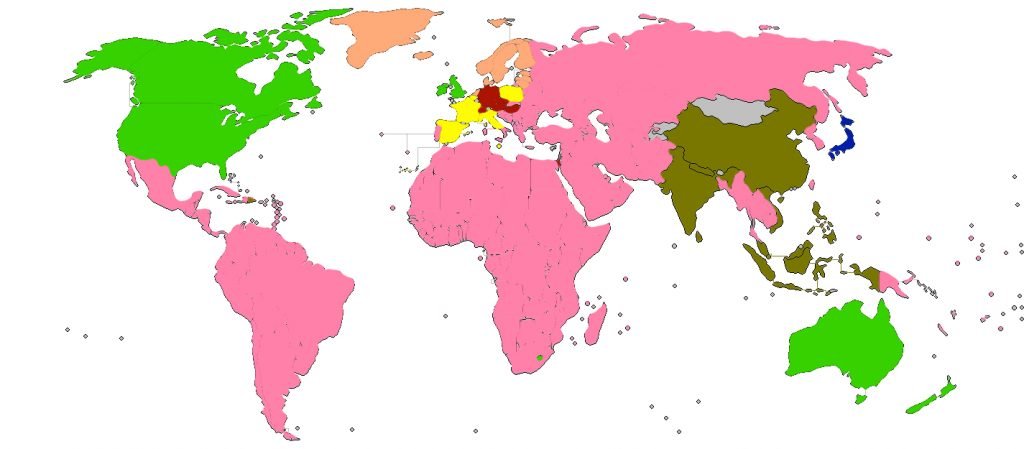Cultural Differences in Business and the Impact of Culture on International Business [4-mins read]
I think you’ll agree with me that cultural differences in business matter. Here are 6 examples and 6 simple & effective strategies to tackle them to your advantage
Look at the following examples. I’m sure you will recognize a couple:
- Why is the European Union struggling so much with itself and the world?
- Why is it almost predictable that the Italian government will always be chaotic?
- For what reason will the Belgians and the French go on strike again in October of this and every following year?
- Why do negotiations between North Korea and the rest of the world always take an unexpected turn?
- Is there a reason that the Chinese have so little respect for patents and contracts?
- Why do Americans think they are the number one in the world?
Which one do you recognize?
The purpose of this article might come across as a bit strange. Why? Because if you’re reading this I would really hope that you are convinced that there are cultural differences in international business. In other words: Culture Matters…
Let’s start with the impact of culture on international business. The good news is Cultural Competence is a skill that can be learned.
Question: “Why does culture matters when doing business international?”
Answer: “Culture eats strategy for breakfast” Dealing with different cultures can be learned. Also by you. It’s a skill that will make you stand out over your competition.”
Cultural Clashes in Business; What Will You Learn?
First, watch this 3-minute video that will give you a simple and clear example of how things can go wrong and how you can avoid that:
Impact of Cultural Differences on Business
The impact of culture in business is huge and often is hugely underestimated. Many people in organizations (and hence organizations) think that we’re just doing business with other people. Period. Fundamentally we’re all the same. Human beings. And that’s it.
We all have two eyes, one nose, two ears, and one mouth. That’s all there is to it.
If you’re on that side of the fence let me ask you a couple of questions:
- What do Indians mean when they shake their hands?
- Why can Latinos give such indirect answers?
- For what reason is everything structured in Germany?
- Why do the Dutch reply to an order/request always with “Why?”
I could go on and on. The fact of the matter is that cultural differences make the world a wonderfully diverse place with, on the other hand, lots of trouble going on.
Here’s a list of points mentioned by the website Investopedia, listing the most important reasons why international mergers fail:
- Limited or no involvement from the owners
- Theoretical valuation vs. the practical proposition of future benefits
- Lack of clarity and execution of the integration process
- Cultural integration issues
- The actual cost of a difficult integration & high cost of recovery
- Negotiations errors
For me, ALL of the above points are directly or indirectly related to cultural differences. In other words, they are all a sign of the impact of culture on international business.
How Does Culture Influence International Business
Then what are those cultural differences in business?
Below is a map of the world where you can see different so-called culture clusters; cultures that are more-or-less comparable (not (!) identical!).

As you can see, there are 7 culture clusters with the pink cluster covering the biggest landmass. Together with the olive-green color, these two have about 80% of the world’s population.
Does that mean that all the pink-colored countries are the same? No.
Take South America for example. Although all countries from Mexico to Chile follow more or less the same trend in the four primary cultural dimensions, there are regional differences. Mexico and Venezuela are a lot “tougher” in their culture (third dimension) compared to Guatemala and Chile.
6 Simple Powerful Strategies That You Can Use Right Now
- The very first thing you should do is read something about the country and culture you’re about to do business with. This sounds like an open door, but have you looked up the very basics of the country you’re looking at? Two resources are reliable and easy to use: The CIA World Fact Book. Just search for the country you’re looking for and you get a very basic overview. The second is good ol’ Wikipedia.
- Strategy number two is relationship building. Invest time and effort to get to know the other person. Don’t only and always talk about work things; talk about what’s happening in their country. Although this might not sound productive, it is highly effective. Don’t know what to talk about? Look online for a local newspaper (Working with China? Read this article and see this website).
- Accept that their way of doing business is probably not the same as your way of doing business. They are called cultural differences. Not cultural good or bad differences. There are just differences, that’s all. In other words, have an open mind.
- Use your network to see if you can tap into the knowledge of others to get to know more about either the country, the company, or even the specific person you’re about to do business with.
- Respect the hierarchy. There’s a good chance that the other culture you’re dealing with has a different approach or outlook on hierarchy. Be careful not to jump hierarchical levels if that’s something you can do in your own culture. Watch and observe first before you do anything like this.
- Follow a course on cultural differences. This sounds like an open door, but it is a very good and effective investment of your time and money should you do so. It’s like learning how to swim; you’ll never unlearn it, will you? You can contact me using the form below or just call or WhatsApp me.
The cultural differences in business play an important role and that role will only increase in the future. Why is that?
Take a look at your iPhone; on almost all Apple products it says that it’s designed in Cupertino California and manufactured in… China. But many other parts of your smartphone will come from different parts of the world. And then there are the logistics of shipping all these goods around the world.
- Cars are not made in one part of the world, but parts of one car are made all around the world.
- The development of medicines always crosses borders. Etcetera…
- Amazon sells stuff from retailers and product makers from all over the world.
- The tomatoes in your fridge… where do they come from?
- Etc.
Culture Matters; What to Do Next?
Cultural differences in international business are here to stay and will play a greater and greater role in the coming future. The impact of culture on international business is so clearly visible if you’re able to scratch beyond the surface and look a tiny bit deeper.
If you want to find out if you’re underestimating the cultural differences in business, read this article: “The 9 signs you’re not getting it; it’s Culture Stupid…”
That’s Not All Though…
To get my personal opinion on this topic, watch this 1-minute video below…
If you want to read more on strategy and culture, read this article.
Read here an article on Brexit and business in the UK.
An article about international negotiations can be found here.
The article “9 signs you’re not getting it; it’s culture stupid” can be found here.
Get a Taste of How Chris Presents, Watch his TEDx Talk
 Call Direct: +32476524957
Call Direct: +32476524957
 European Office (Paris) Whatsapp: +32476524957
European Office (Paris) Whatsapp: +32476524957
The Americas (USA; Atlanta, GA; también en Español): +1 678 301 8369
Book Chris Smit as a Speaker
If you're looking for an Engaging, Exciting, and Interactive speaker on the subject of Intercultural Management & Awareness you came to the right place.
Chris has spoken at hundreds of events and to thousands of people on the subject of Cultural Diversity & Cultural Competence.
This is What Others Say About Chris:
- “Very Interactive and Engaging”
- “In little time he knew how to get the audience inspired and connected to his story”
- “His ability to make large groups of participants quickly and adequately aware of the huge impact of cultural differences is excellent”
- “Chris is a dedicated and inspirational professional”
In addition, his presentations can cover specific topics cultural topics, or generally on Cultural differences.
Presentations can vary anywhere from 20 minutes to 2 hours and are given worldwide.
Book Chris now by simply sending an email. Click here to do so.
Read more about what Chris can do for you.
- Percentage of People Rating a Presentation as Excellent 86%
- Rating the Presentation as Practical 89%
- Applicability of Chris' presentation 90%
About Peter van der Lende

Peter has joined forces with Culture Matters.
Because he has years and years of international business development experience joining forces therefore only seemed logical.
Being born and raised in the Netherlands, he has lived in more than 9 countries of which most were in Latin America.
He currently lives in Atlanta, Georgia (USA) with his family.
You can find out more at https://expand360.com/
Or find out what Peter can do for you here.
- 198 Cultural Differences and Government with Maria Paula Correa - 18 November 2025
- 197 Product Sourcing in China with Omer Sasson - 7 November 2025
- 196 Cultural Differences with Sarah Williams - 28 October 2025

 Call Direct: +32476524957
Call Direct: +32476524957 European Office (Paris) Whatsapp: +32476524957
European Office (Paris) Whatsapp: +32476524957